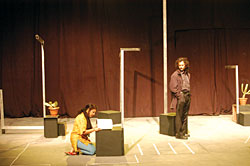 KIRAN PANDAY |
During a conversation, the theatre legend ends up giving the impression that he hasn't really been paying attention. But you realise later that he uses every word as raw material for the stage. Watch your words and mannerism when you talk to this man: he eats, drinks, sleeps and dreams theatre.
It's impossible to think of Sunil being married to anybody other than Nisha Sharma. If he is fire, she is earth. Nisha's deep eyes complement Sunil's penetrating gaze as they plan their next show, mentor apprentices for the stage, interact with counterparts from the other arts or chat with friends under the thatched gazebo inside Gurukul premises.
The couple has stayed afloat during most trying times, including censorship under the royal-military regime. The landlord wants them to relocate Gurukul without realising that it's impossible to take Indrachok or Dharahara and replant it somewhere else. The evolution of the Gurukul Complex in Baneswar is a part of Nepal's theatre history.
In these times of drought, diarrhoea and stillborn revolution, it may appear silly to talk about the state of theatre. But the arts are a society's soul. Theatre explains life, makes it understandable, and to understand is to learn to endure. Perhaps that could be the reason theatre is possible even when poetry becomes painful, paintings begin to frighten and music is declared blasphemous. That is why dictators fear the stage so much.
For over 20 years now, Aarohan has maintained its commitment to theatre because of people like Sunil and Nisha. The only other group with a similar track record is perhaps the Janakpur-based Mithila Natyakala Parishad where members spare time from day jobs to keep the tradition of Maithili theatre alive. With Gurukul, the Aarohan movement became an institution that had bred its own competitors. With competition come rivalry, jealousy, antagonism and attendant pathologies.
The charge that Sunil is highly individualistic is perhaps true: great art is seldom a collective enterprise. All of Soviet Empire could not produce one Tolstoy and Alexander Solzhenitsyn was created by Stalin's oppression. Lu Xun never joined the Chinese Communist Party and the regime since then has failed to inspire a single narrator worthy of his mantle. Most artists do what they want to do rather than what the headquarter or the politburo tells them to do.
Over the years, presentations at the Sama Theatre have been eclectic. From traditional to happenings, all kinds of shows have been staged at a place that has become a popular landmark despite being located at an unremarkable place.
For reasons that only Sunil can convincingly explain, a great number of his presentations are adaptations of western classics. Even then, there are enough plays where Bertolt Brecht's belief (that theatre should appeal not to the spectators' feelings but to their reason) finds resonance.
Sunil and Nisha are too engrossed in their art to lobby with politicos, industrialists, military generals, militant leaders or gatekeepers of the media. But that doesn't mean they don't need everyone's support in keeping the theatre going in these difficult times.
For the collective sanity of at least a section of highly stressed Kathmandu society, the curtains should not close on Gurukul.



